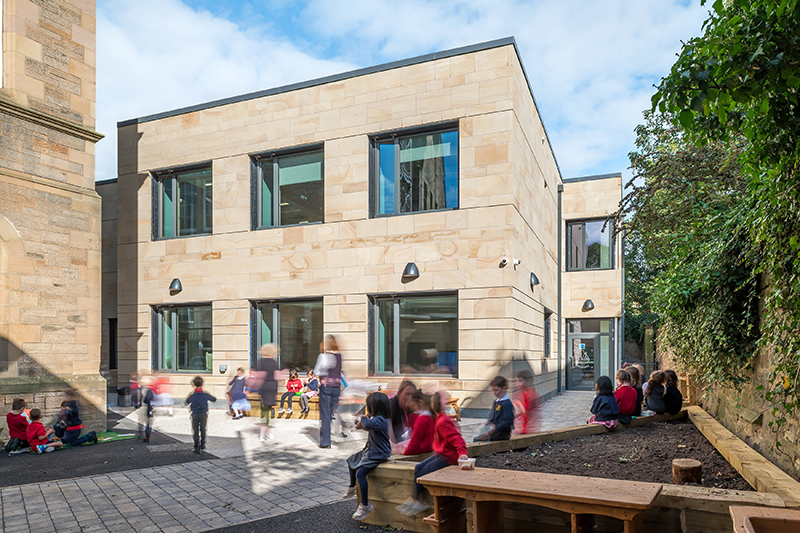
THE first Passivhaus primary school project in Scotland constructed from cross-laminated timber (CLT) has opened in Edinburgh.
The £3.2 million, two-storey extension to Sciennes Primary School – a B-listed building in the Marchmont conservation area of the city – was designed by Holmes Miller, with Maxi Construction the principal contractor.
The new-build element offers the school four additional classrooms that lead to shared flexible teaching areas. Large windows with integrated seats, and ‘extensive’ use of rooflights maximise natural light throughout the building, while improved landscaped areas in the playground are intended to encourage outdoor learning.
The exterior stonework was chosen to complement the existing school building, which dates from 1892, and its context within a conservation area. The use of cross-laminated timber as the primary structural material for the walls, floor, roof and partitions is said to contribute to a ‘warm and soothing’ interior environment, as well as delivering ‘exceptional’ air tightness performance.
To achieve the Passivhaus standard, the building’s design follows a fabric first approach, focusing on air-tightness and thermal performance. The use of triple glazing and heavily insulated walls and roofs helps achieve this, while mechanical ventilation heat recovery systems and air source heat pumps reduce energy consumption and improve thermal control.
Clara Garriga, project director at Holmes Miller and lead architect for the project, said, “The new extension to Sciennes Primary School is a further example of Holmes Miller and City of Edinburgh Council’s commitment to environmentally sustainable and ethical design and building practices. We’ve worked with the Council extensively on school projects, and they were integral to the design process, with significant input into how the spaces would be used.
“We are really pleased with how the cross-laminated timber looks and how it’s performing; it has given the interior spaces a real warmth that we wouldn’t have achieved otherwise, and the air tightness of the building is 0.28, which is excellent. The team has loved seeing the building come to life, and with Scotland’s ambitions for net zero gaining increasing importance, we hope this will be the first of many educational projects of its kind.”
Councillor Joan Griffiths, education convener at the City of Edinburgh Council, added, “We know that the energy used to heat our buildings is a major contributor towards emissions so decarbonising our building stock is a crucial part of achieving this goal. Designing Passivhaus in our schools and our wider estate significantly reduces heating costs, improves user comfort and the learning environment. The new classroom block at Sciennes is our first fully Passivhaus school building and we want it to set the standard and be a model for how we look to build low carbon schools.”
Brian Watters, Maxi Construction’s contracts manager, commented, “We at Maxi Construction are delighted with the success of this project, both in the quality of finish and how the project team embraced the requirements of Passivhaus. Executing design principles of Passivhaus was unchartered territory for us, but after this we can say they are not to be feared, especially given what we have achieved on this build with air tightness. This is one to be proud of for many years to come.”
Sussed Sustainability was the Passivhaus advisor on the project, while design stage M&E engineers were the City of Edinburgh Council’s sustainable development team. Blackwood Partnership provides construction Stage M&E engineering services, with Will Rudd Davidson the C&S engineers.








